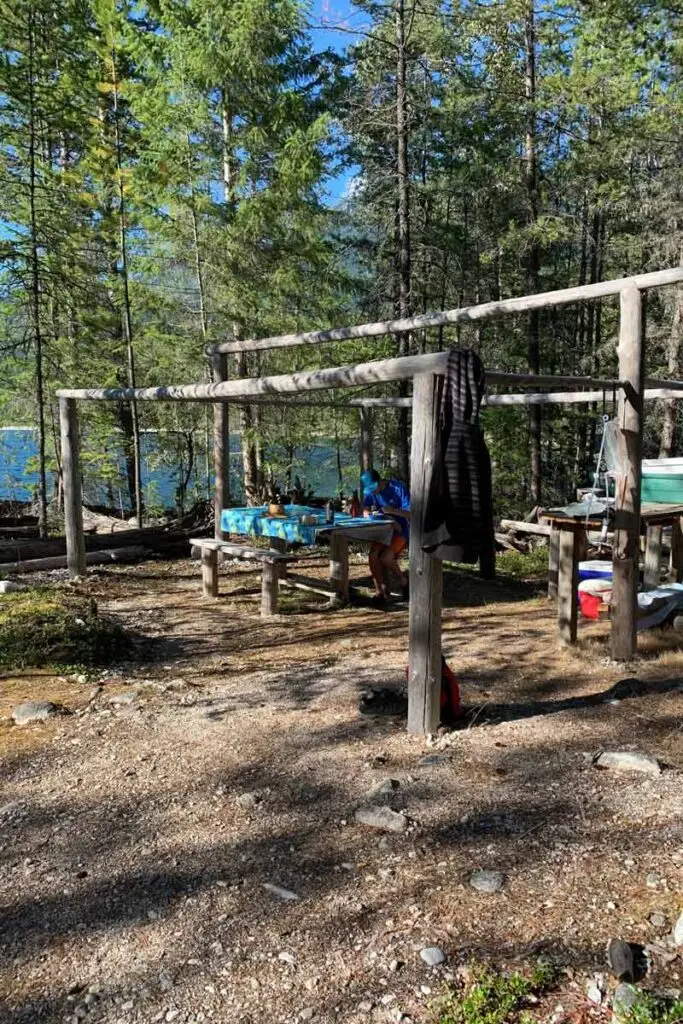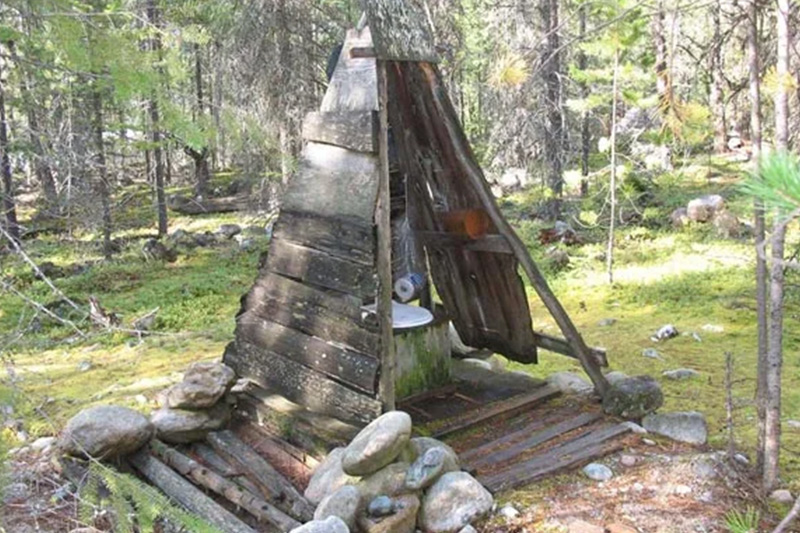Camp Facilities
What is Provided
Wilderness camp has only trees, the lake, the beach, and space — plus outhouses. There is firewood to be found on the beach and around the property and clean water and air. A camp supply tent includes basic tools (shovel, ax, saw) which are there for you to borrow and return.
All tasks are done by volunteers, including you. The volunteer camp director collects fees, organizes volunteer boat operators, and oversees general operations of the site.
Campsites
As this is a wilderness camp, you are responsible for choosing a campsite that meets your safety standards.
Please keep in mind that trees fall down from wind and age. Some campsites have fewer trees and are more open than others but no campsite is completely safe from the possibility of falling trees.
Also, cupboards, tables, chairs, ridge poles and other unique ‘features’ that have been built by campers from driftwood, dead trees, and rocks may not be stable or secure.
No one maintains these structures. Use at your own risk.
Do not drive nails or screws into live trees. If you find some trees with nails/screws in them from past campers, please remove them.
Please do not leave plastic tablecloths behind; take them with you.
Large groups may be asked to camp at specific sites, or split and occupy more than one site, to reduce impacts to the surrounding environment.


Biffies (Toilets)
There are artfully constructed, roofed pit toilets situated within easy reach (but not too easy) of each campsite.
They are repositioned every few years. Maintenance is a volunteer job, including supply of toilet paper, and “knocking down the hills”. Please supervise children in the proper use of outhouses. If toilet paper is low, take it upon yourself to re-supply from the camp supplies tent.
In 2000 a group of innovative campers constructed our first composting toilet near the main beach. There is one composting toilet on site. Please follow composting toilet instructions regarding the proper use of wood chips and straw. Flush with water every few days to control any odours. If in doubt, ask the Camp Director.
Garbage
If you brought it to camp, you must take it away with you.
Campers are expected to take care of their own garbage — the camp does not provide disposal. Do not bury food scraps or toss them into the forest or pit toilets.
If there is a fire ban, ALL garbage will need to be hauled out. Otherwise, burn appropriate waste and food scraps in your fire pit. Cans should be washed or burned, flattened, and taken out with you, together with washed bottles and other non-combustible waste. Do not burn plastic as noxious fumes result.
Proper garbage disposal is necessary so we don’t provide attractive scents for small and large animals.
When departing camp, do not leave garbage by the side of the road or at Provincial campgrounds along the lake.
There is a dump just north of Kaslo and recycling depot just south of Kaslo. Ask the camp director for locations.
Water Craft
CAMP BOAT: Lifejackets are required for all passengers on camp boats. Waiver forms are required prior to transportation. All volunteer boat operators must have a Department of Transport Boat Operator Card.
Canoes and paddle boards are available for shared use. Life jackets are available in limited supply, and are highly recommended. Please supervise your children at all times. All camp equipment is shared between all campers and used at your own risk. It is the responsibility of all campers to use equipment with care and respect to prevent damage.
Motorized watercraft (other than the camp boat and other craft at the Camp Director’s and Board’s discretion) are not permitted at the property at any time.
Water
DRINKING WATER: Most people drink the glacier-fed creek water, and use lake water for washing. If you have concerns, boil your water or bring a water filter.
GRAY WATER: Gray water is to be spread around, not poured into a sump hole, the lake or the creek. Washing dishes or cleaning fish should not be done in the creek since there are other campers downstream. Use biodegradable soap.
Music
Keep noise within your personal space. If you bring recorded music or a radio, either use earphones or keep the volume low enough that it cannot be heard beyond your campsite. If you are asked to turn down the music please do so.